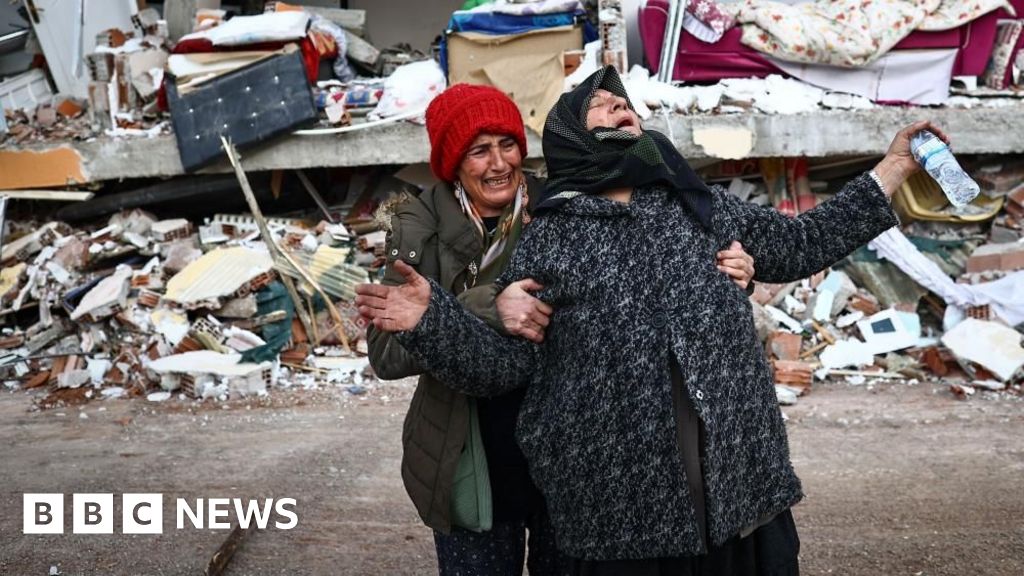BBC News
 EPA
EPAGoogle has admitted its earthquake early warning system failed to accurately alert people during Turkey’s deadly quake of 2023.
Ten million people within 98 miles of the epicentre could have been sent Google’s highest level alert – giving up to 35 seconds of warning to find safety.
Instead, only 469 “Take Action” warnings were sent out for the first 7.8 magnitude quake.
Google told the BBC half a million people were sent a lower level warning, which is designed for “light shaking”, and does not alert users in the same prominent way.
The tech giant previously told the BBC the system had “performed well” after an investigation in 2023.
The alerts system is available in just under 100 countries – and is described by Google as a “global safety net” often operating in countries with no other warning system.
Google’s system, named Android Earthquake Alerts (AEA), is run by the Silicon Valley firm – not individual countries.
The system works on Android devices, which make up more than 70% of the phones in Turkey.
More than 55,000 people died when two major earthquakes hit south-east Turkey on 6 February 2023, more than 100,000 were injured. Many were asleep in buildings that collapsed around them when the tremors hit.
Google’s early warning system was in place and live on the day of the quakes – however it underestimated how strong the earthquakes were.
“We continue to improve the system based on what we learn in each earthquake”, a Google spokesperson said.
How it works
Google’s system, is able to detect shaking from a vast number of mobile phones that use the Android operating system.
Because earthquakes move relatively slowly through the earth, a warning can then be sent out.
Google’s most serious warning is called “Take Action”, which sets off a loud alarm on a user’s phone – overriding a Do Not Disturb setting – and covering their screen.
This is the warning that is supposed to be sent to people when stronger shaking is detected that could threaten human life.
AEA also has a less serious “Be Aware” warning, designed to inform users of potential lighter shaking – a warning that does not override a device on Do Not Disturb.
The Take Action alert was especially important in Turkey due to the catastrophic shaking and because the first earthquake struck at 04:17, when many users would have been asleep. Only the more serious alert would have woken them.
In the months after the earthquake the BBC wanted to speak to users who had been given this warning – initially with aims to showcase the effectiveness of the technology.
But despite speaking to people in towns and cities across the zone impacted by the earthquake, over a period of months, we couldn’t find anyone who had received a more serious Take Action notification before the quake struck.
We published our findings later that year.
Google researchers have written in the Science journal details of what went wrong, citing “limitations to the detection algorithms”.
For the first earthquake, the system estimated the shaking at between 4.5 and 4.9 on the moment magnitude scale (MMS) when it was actually a 7.8.
A second large earthquake later that day was also underestimated, with the system this time sending Take Action alerts to 8,158 phones and Be Aware alerts to just under four million users.
After the earthquake Google’s researchers changed the algorithm, and simulated the first earthquake again.
This time, the system generated 10 million Take Action alerts to those at most risk – and a further 67 million Be Aware alerts to those living further away from the epicentre
“Every earthquake early warning system grapples with the same challenge – tuning algorithms for large magnitude events,” Google told the BBC.
But Elizabeth Reddy, assistant professor at Colorado School of Mines, says it is concerning it took more than two years to get this information.
“I’m really frustrated that it took so long,” she said
“We’re not talking about a little event – people died – and we didn’t see a performance of this warning in the way we would like.”
Google says the system is supposed to be supplementary and is not a replacement for national systems.
However some scientists worry countries are placing too much faith in tech that has not been fully tested.
“I think being very transparent about how well it works is absolutely critical,” Harold Tobin, director of the Pacific Northwest Seismic Network, told the BBC.
“Would some places make the calculation that Google’s doing it, so we don’t have to?”
Google researchers say post-event analysis has better improved the system – and AEA has pushed out alerts in 98 countries.
The BBC has asked Google how AEA performed during the 2025 earthquake in Myanmar, but has yet to receive a response.




